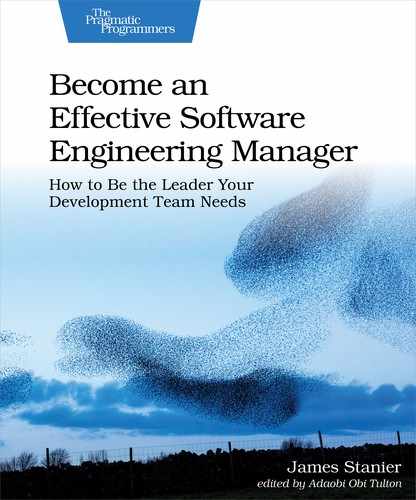What to Do on the Day
The good news is that if you’ve done all of your preparation, your performance on the day should be relatively straightforward. Before you go into the room, reread the review form and peer feedback and think about the items that you think you definitely should discuss. Using the shared review form, you’ve already communicated a great deal: both of you have written your thoughts and feelings and digested them. Remember that even if your feedback was critical, they’ve had that opportunity to assume responsibility for it. Don’t dwell on the negative side of the critique. This meeting is for optimistic discussion on how they can move on through it.
A big mistake is to spend the meeting just stepping through everything that you’ve listed in the written review. Don’t do this: it’s not a good use of either of your time. Instead, try and split the meeting into three parts of equal size:
- A reflective discussion about the period that has just passed.
- A forward-thinking discussion about the future.
- A collaborative session drafting goals that they can achieve.
In the first two parts, keep the discussion loose and let them do the talking. Ask questions and nudge them along to explore how they feel. Try not to presuppose or suggest too much. This meeting is not where they need to have a revelation about themselves, but instead it’s a milestone in a continuous process. You should both be continuing to have these discussions about their career in your one-to-ones.
For example, here are some leading questions that you could ask in reference to the content of the written review form:
-
What is it about that achievement that made you feel so proud? Do you feel like that often, or was this a unique occasion?
-
You’ve mentioned that you want to develop that particular area. How do you think you can do that, and how can I support you in doing so?
-
How do you feel about your team? Who in particular do you most like working with? Is there anyone that you find harder to work with? Why is that?
-
How challenging is the work that you’re doing now compared to the last few years? Are you getting enough opportunity to stretch yourself and to learn new things?
-
How does your current role compare to where you predicted that you’d be five years ago? Why is that?
-
What do you think of my performance as your manager? What can I do to support you and the team better?
Regardless of the actual questions, use some simple guiding principles:
-
At this stage, prompting their reflections is more important than you giving yours. You’ve done your part in writing. This is where they begin to figure out what it all means and where they would like to go.
-
You’re not there to figure out their future career for them, but you’re there to listen and facilitate the conversation.
-
Keep the thought bubble over their head.
During the last third of the review, begin drafting some goals for the next six months together. You don’t need to complete them in the review, but you should begin the thought process collaboratively. What would they like to achieve over the next six months? Is there a clear route to get there? What will they need to do or learn to get there? How can you support them as their manager? If you get some initial notes down between you, then they can continue to work on them after the review meeting and you can revisit them in your one-to-ones.
For example, you could prompt the conversation by asking:
-
What’s one thing at the company that you would love to work on?
-
Is there anyone here that you look up to, and what traits do they have?
-
How can you increase your impact in your work and in your relationships with your colleagues?
-
What could you achieve in the near future that would make you feel proud?
The questions that you can ask are plentiful. Planning for the future can be exciting.
And that’s it! The day itself should be straightforward if you’ve done all of the preparation that we’ve talked about. If you’ve put in the work up front, the meeting should just unfold in front of you. And even if it doesn’t, just keep the thought bubble over their heads, ask leading questions to provoke conversation, and listen actively and attentively. Good luck.
